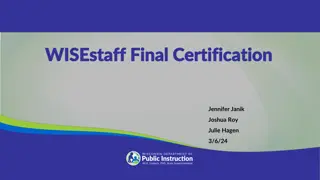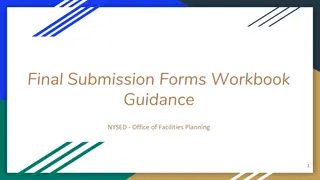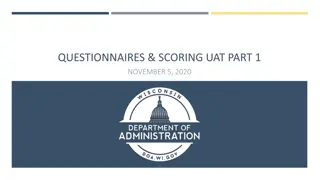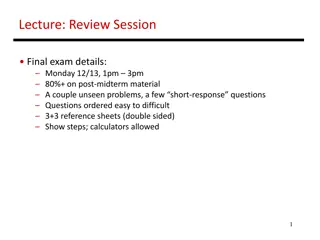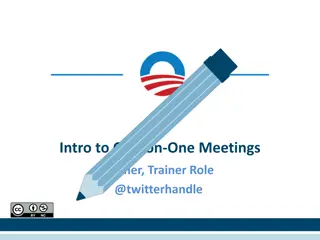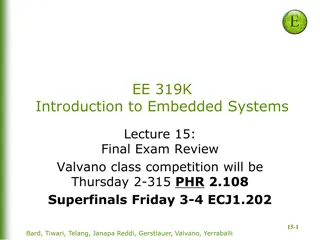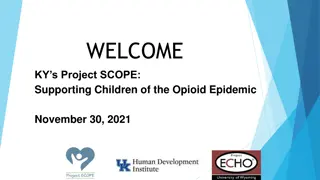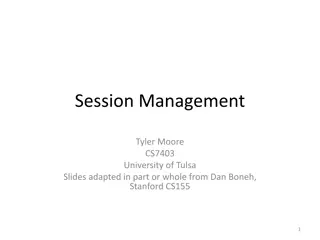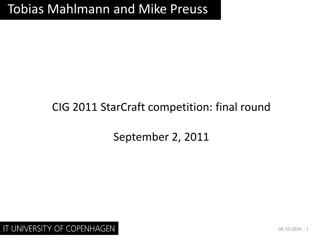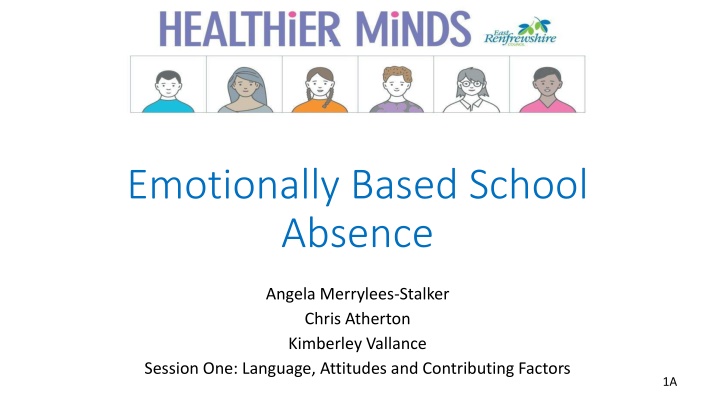
Emotionally Based School Absence and Intervention Strategies
Explore the language, attitudes, and contributing factors related to emotionally based school absence. Sessions cover assessment, planning, interventions, and peer coaching. Discover terminology, case studies, and strategies for addressing school attendance challenges.
Download Presentation

Please find below an Image/Link to download the presentation.
The content on the website is provided AS IS for your information and personal use only. It may not be sold, licensed, or shared on other websites without obtaining consent from the author. If you encounter any issues during the download, it is possible that the publisher has removed the file from their server.
You are allowed to download the files provided on this website for personal or commercial use, subject to the condition that they are used lawfully. All files are the property of their respective owners.
The content on the website is provided AS IS for your information and personal use only. It may not be sold, licensed, or shared on other websites without obtaining consent from the author.
E N D
Presentation Transcript
Emotionally Based School Absence Angela Merrylees-Stalker Chris Atherton Kimberley Vallance Session One: Language, Attitudes and Contributing Factors 1A
Session One: Language, Attitudes and Contributing Factors Session Two: Assessment and Information Gathering Session Three: Outcome Focused Planning Session Four: Interventions and Evidence-Based Practice Peer Coaching Sessions in between 1A
Monday 16th January 2023 3.45 4.45pm EBSA Session One: Language, Attitudes and Contributing Factors Angela Merrylees-Stalker (Healthier Minds Team); Chris Atherton (Educational Psychology Service): Kimberley Vallance (EBSA Service) Monday 23rd January 2023 3.45 4.45pm EBSA Peer Coaching Session (Drop In) Angela Merrylees-Stalker (Healthier Minds Team); Kimberley Vallance (EBSA Service) Monday 30th January 2023 3.45 4.45pm EBSA Session Two: Assessment and Information Gathering Angela Merrylees-Stalker (Healthier Minds Team); Chris Atherton (Educational Psychology Service); Kimberley Vallance (EBSA Service) Monday 20th February 2023 3.45 4.45pm EBSA Session Three: Outcome Focused Planning Angela Merrylees-Stalker (Healthier Minds Team); Chris Atherton (Educational Psychology Service); Kimberley Vallance (EBSA Service) Monday 27th February 2023 3.45 4.45pm EBSA Peer Coaching Session (Drop In) Angela Merrylees-Stalker (Healthier Minds Team); Kimberley Vallance (EBSA Service) Monday 6th March 2023 3.30 5.00pm EBSA Session Four: Interventions and Evidence-Based Practice Angela Merrylees-Stalker (Healthier Minds Team); Chris Atherton (Educational Psychology Service); Kimberley Vallance (EBSA Service); Gill Van Looy (Barrhead High School) (Course Evaluation) Monday 13th March 2023 3.45 4.45pm EBSA Peer Coaching Session (Drop In) Angela Merrylees-Stalker (Healthier Minds Team); Kimberley Vallance (EBSA Service) 1A
Session One Brief overview of some stats (get the boring but important stuff out of the way first). Terminology and why it matters Contributing Factors for EBSA Current Example/ Case Study Q&A 1A
Emotional Based School Avoidance (Rae, 2020) School Anxiety Based School Refusal (LCC, 2020) Disengagement (MacKay-Brown et al., 2019). Persistent/Chronic School Absence (BPS, 2015; Lauchlan, 2007) Emotional Based School Non- Attendance (Corcoran, Bond & Knox, 2022) School Refusal Behaviour (Kearney & Albano, 2018) School Attendance Problems (Gonz lvez et al., 2021) 1A
So what? So what about TRUANCY TRUANCY 1A
If the list is endless, how do you decide? 1A
Language Matters It can impact: Our viewpoint Our mindset How we view and respond to the young people What we do first What we do next How we engage with the family, partners and other agencies How we move things forward to meet the needs of the young person unable to attend school 1A
Attendance Matters: A Practitioners Guide for Responding to EBSA in East Renfrewshire (in Draft) Emotionally Based School Absence (EBSA) A pattern of behaviours indicating that a child or young person is not attending school due to underlying emotional reasons. These reasons can be due to factors within and out-with the school environment. 1C
Risks Where sustained over a long period of time, EBSA can have a significant and detrimental impact on the child or young person s: Learning Social development Emotional regulation EBSA is closely associated with poorer short and long term outcomes, including: Relationship difficulty Difficulty mastering emotions in challenging situations Difficulty sustaining positive destinations such as further education, employment or training Increased likelihood of poor mental wellbeing (Kearney and Albano, 2018) 1C
Contributing Factors/Motivating Conditions: What are they? Child- specific factors Factors at school Factors at home EBSA Systemic Factors 1C
EBSA Behaviours EBSA behaviours are very common in children and young people Diverse in their presentation Visible and familiar: demonstrative behaviours e.g. separation anxiety persistent late-coming leaving the school building patterns of absence around trigger points (e.g. transitions, specific classes) Crying, pleading, sleep problems, physical symptoms related to the intensity of the anxiety (Rae, 2020). Subtle: regular periods of self-certified absence any others? 1C
EBSA Behaviours Many of these are addressed by effective parenting strategies Some through collaboration, between parents / carers and school - effective monitoring and support procedures. In some cases, these behaviours can develop into severe and prolonged periods of non-attendance that become deeply problematic. 1C
Contributing Factors There are some patterns which are worth considering where children and young people may be more vulnerable. These include children and young people who have: anxiety low mood emotional lability neurodevelopmental differences such as an autistic spectrum condition, dyslexia, or significant learning needs experienced significant trauma responsibilities as young carers However, each case of EBSA needs to be assessed in order to identify and address the unique factors that are contributing to the behaviour 1C
Age Related Patterns Ages 5 11 Children will tend to refuse school due to negative affectivity or for attention Ages 12-17 Young people will tend to refuse school to escape social or evaluative situations and or obtain tangible rewards outside of school Kearney and Albano (2018) 1C
What contributes to EBSA? Case study discussion Break Out rooms Professional Dialogue Share your thoughts, ideas and questions Report back to wider group 1C
Meet Jane Jane is in S2. She has been struggling to come into school for 2 months now. Prior to the first lockdown she had coped well with school and was able to handle each day and seemed to enjoy her subjects, despite having a tricky transition from P7 to S1. Since the second lockdown she has been increasingly anxious and worried about coming to school and has recently found that socialising with her friends is also becoming a challenge. Jane was recently assessed (4 months ago) and confirmed as having ASC. Jane started to leave class and hide in the toilets at first and this escalated to leaving the building and break and lunch times. She then found it harder to come in in the morning and mum described the experience and home as a bomb going off when Jane had to cross the threshold each morning. Monday mornings are particularly tricky for Jane and when asked what will help her she explains that she does not know. School are very concerned that she is missing so much and have made some adjustments to her timetable to support her back to school but cannot pin down exactly what will help Jane as she is unable to explain it in detail. Mum is distressed and just wants help for her daughter. Jane can sustain some time in school but it has been noted that she finds the time after lunch especially hard. 1C
Break out room discussion points What might the EBSA contributing factors be for Jane? What might you do to support her in your school/context/setting? Where would your starting point be? 1C
So far we have Reviewed terms used to describe Emotional Based School Absence Considered the impact of the language we use to frame the issue Touched upon (because the complexity cannot be underestimated) motivating conditions and their contribution to EBSA Explored contributing factors through a real life or case study discussion 1A
Q & A 1A
Thank you for taking the time to join us. If you have any questions, before we next meet on Monday 30th January at 3.45pm, please feel free to get in touch. Peer Coaching Drop-In next week: Monday 23rd January 3.45pm Angela.Merrylees@eastrenfrewshire.gov.uk 07788 496 711 1A



